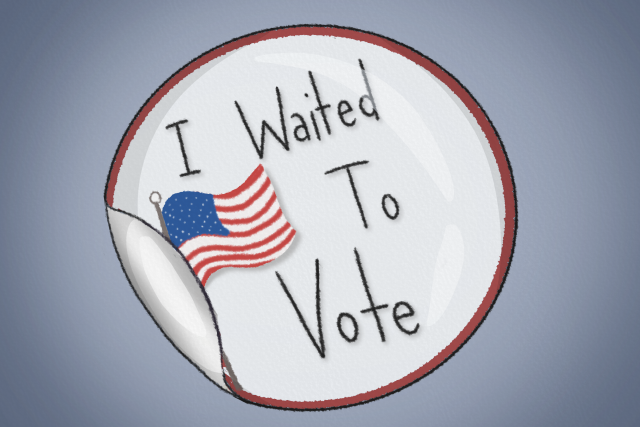[ad_1]
It’s almost impossible to not feel the buzz surrounding the upcoming presidential election, whether you’re on the Diag, State Street or just about anywhere on campus. Tables line the sidewalks around academic buildings, populated with students asking if you’ve registered to vote. Even in my classes — which, admittedly, are policy and politics related — it seems that I can’t go to a lecture without jumping into some form of discussion regarding the election. Needless to say, the excitement and anxiety that comes along with election season have most definitely made their way onto the University of Michigan campus.
For much of the University’s undergraduate student body, including myself, this will be the first presidential election we are old enough to vote in. However, just because most of us finally can vote doesn’t mean all of us will vote — and the reason why isn’t necessarily up to us. When looking at reasons why people did not vote in 2020, the U.S. Census Bureau found that conflicting responsibilities and schedules were among the most common explanations.
Looking at past election days at the University, it’s not surprising that people found themselves “too busy” to cast their votes. In 2022, some U-M students waited for six hours outside the University of Michigan Museum of Art to fill out their ballots and vote in the midterm elections, causing many to miss class, work and extracurriculars.
The University has both a politically and academically engaged campus, and many students are deeply committed to their coursework. It’s understandable that these students don’t have six hours to sacrifice on a Tuesday during midterm season and weeks before final exams. While it’s invigorating and motivating to be a part of a student body so passionate about both their politics and their academics, it can be frustrating when those priorities come into conflict with each other.
To solve these conflicting goals, the University must take a more active role in making it easier for students to vote. This could involve canceling classes or opening more voting centers on Central Campus and the surrounding areas.
While there are voting centers around Ann Arbor, the UMMA is the only location available to students on Central Campus. Opening additional centers would diffuse the concentration of students waiting to vote at that one location, saving students the hours they may otherwise have to sacrifice homework and other work for. The struggle with this suggestion, however, is that UMMA and these additional locations are primarily staffed with volunteer poll workers. Often, these volunteers are U-M students, meaning that to open new centers, more students would have to miss their classes for Election Day. Unless, of course, the University were to cancel classes.
Other universities have already taken this step. Loyola Marymount University closed their classroom doors for the midterm elections in 2018 after months of student organizing efforts and saw an increase in student-voter turnout. Universities across the country are following in LMU’s footsteps and it’s not just to play hooky. A 2017 poll taken at Rutgers University showed that 95% of students would be more inclined to vote if classes were canceled on the day of the presidential election.
Requesting that U-M administration consider student-voter accessibility is not outlandish. Members of the University’s Board of Regents have pledged to uphold and support the values of the United States Constitution — this oath includes supporting the right to vote Even if the effort to cancel class on Election Day would take too long to pass through Central Student Government and U-M Administration, professors could reconsider their attendance policies on Nov. 5 and allow their students to engage in democracy.
At the individual student level, it’s on us to take the time to research and become familiar with different state voting policies. Student organizations like Turn Up Turnout and other voting coalitions have made courageous efforts to increase the number of students registering to vote. The Campus Voting Hubs, namely the UMMA, opened Tuesday to encourage early voting and registration. Additional voting hubs will open soon after.
The bottom line is no matter what state you want to vote in, how or when you want to vote or who you want to vote for, you should vote. The University can, and should, make that process easier.
Margot Barrera is an Opinion Analyst from Los Angeles, Calif. She writes about American politics, culture and student life. She can be reached at msbarrer@umich.edu.
Related articles
[ad_2]
Source link











